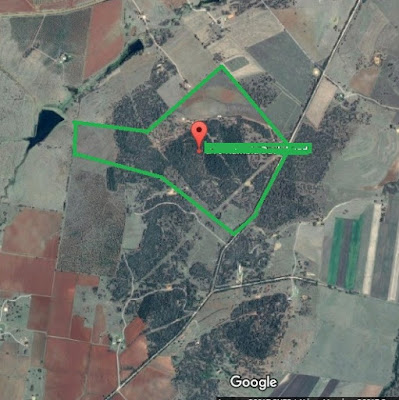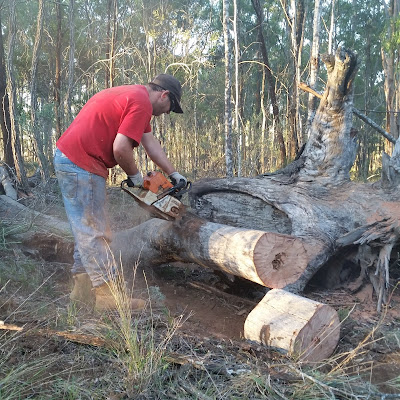The Hidden Life of Trees - a review
Every time I share a book review I include Amazon affiliate links, and if you use those links to buy things I gradually build up Amazon credit. Earlier this year I used my credit to order a couple of books, which I finished reading ages ago, but haven't had a chance to share with you until now. I just wanted to say again, thanks for using my affiliate links because it does help me to buy more books!
One of the books that I bought was The Hidden Life of Trees: What They Feel, How They Communicate—Discoveries from a Secret World . I had heard an interview with the author of this book on ABC radio national which had really caught my interest. We own a lot of trees, as you can see in the image below. Our property was on the market for a long time before we bought it because it has so many trees (about 100 acres of our 258 acres) and most are protected under QLD vegetation management laws, so they can't be cleared. Farmers around here believe that trees are unproductive and would prefer cleared land.
. I had heard an interview with the author of this book on ABC radio national which had really caught my interest. We own a lot of trees, as you can see in the image below. Our property was on the market for a long time before we bought it because it has so many trees (about 100 acres of our 258 acres) and most are protected under QLD vegetation management laws, so they can't be cleared. Farmers around here believe that trees are unproductive and would prefer cleared land.
We were actually looking for land with some forest cover for a few reasons:
So you can see why I wanted to read this book! It was written by a professional forester and has been translated from the original German. It describes everything he has learnt during his career managing forests in Eifel mountains. As per the title, the book explains how trees communicate with each other and what they sense about their environment.
Here's a few of the facts that stood out to me:
My only disappointment is that someone has yet to write a similar book about gum trees! This book focuses on beech and oak trees, which are not familiar trees here in Australia. I'm sure that the general principles apply, but I would love to know more of the specifics.
One of the books that I bought was The Hidden Life of Trees: What They Feel, How They Communicate—Discoveries from a Secret World
 |
| Our property within the green boundary has a large proportion of tree cover compared to neighbouring properties |
We were actually looking for land with some forest cover for a few reasons:
- Shade for cattle
- Building materials
- Firewood
- Soil fertility (as per Peter Andrews)
- Food for bees
- Habitat for native animals
We recently learnt more about managing our bushland using occasional fire, and I'm always interested to learn more about trees and how we can optimise our forest areas.
So you can see why I wanted to read this book! It was written by a professional forester and has been translated from the original German. It describes everything he has learnt during his career managing forests in Eifel mountains. As per the title, the book explains how trees communicate with each other and what they sense about their environment.
Here's a few of the facts that stood out to me:
- Trees connect using their roots and they can share nutrients to help "friends" who are not doing as well - this explains why single trees don't thrive, we often see a lonely single tree remaining in a paddock, and they are often dead, trees need connections to other trees! A shelter belt or group of trees is better than leaving a single tree here and there. Fungi also help in this process by building a network that links tree roots.
- Trees also release chemicals when they are being attacked by microbes or insects, and this not only warns other trees, but also helps to attract predators.
- Some trees only fruit some years (not every year) and they seem to coordinate this (mechanism yet unknown) which is thought to be a way of discouraging mammals etc that feed on their seeds by not allowing them excess food to increase population every year.
- Setting fruit is also a lot of work for a tree and they can become weaker as a result.
- There are lots of good reasons for trees to grow slowly (helps them to grow strong healthy trunks) and mother trees help to regulate the growth of their seedlings. However older trees grow faster - if we are interested in sequestering carbon we need to let forests grow old.
- We still don't really know how water travels all the way from the roots to the leaves of very tall trees! However we do know that it is trees that make rain away from the coast, so maybe we should stop cutting them down in central Australia..
- Up to half the biomass in a forest is below the surface - in the soil.
- Trees have a cooling effect on the surrounding air, not just due to the shade, also the transpiration of moisture from the roots to the leaves.
- We don't know yet how trees anticipate spring or changing seasons in general
My only disappointment is that someone has yet to write a similar book about gum trees! This book focuses on beech and oak trees, which are not familiar trees here in Australia. I'm sure that the general principles apply, but I would love to know more of the specifics.
Do you value trees? Are you interested in how they communicate and what they feel? Well you might just find this an interesting little book then!
Please support my blog by using my Amazon Affiliate links:






















Leave a comment